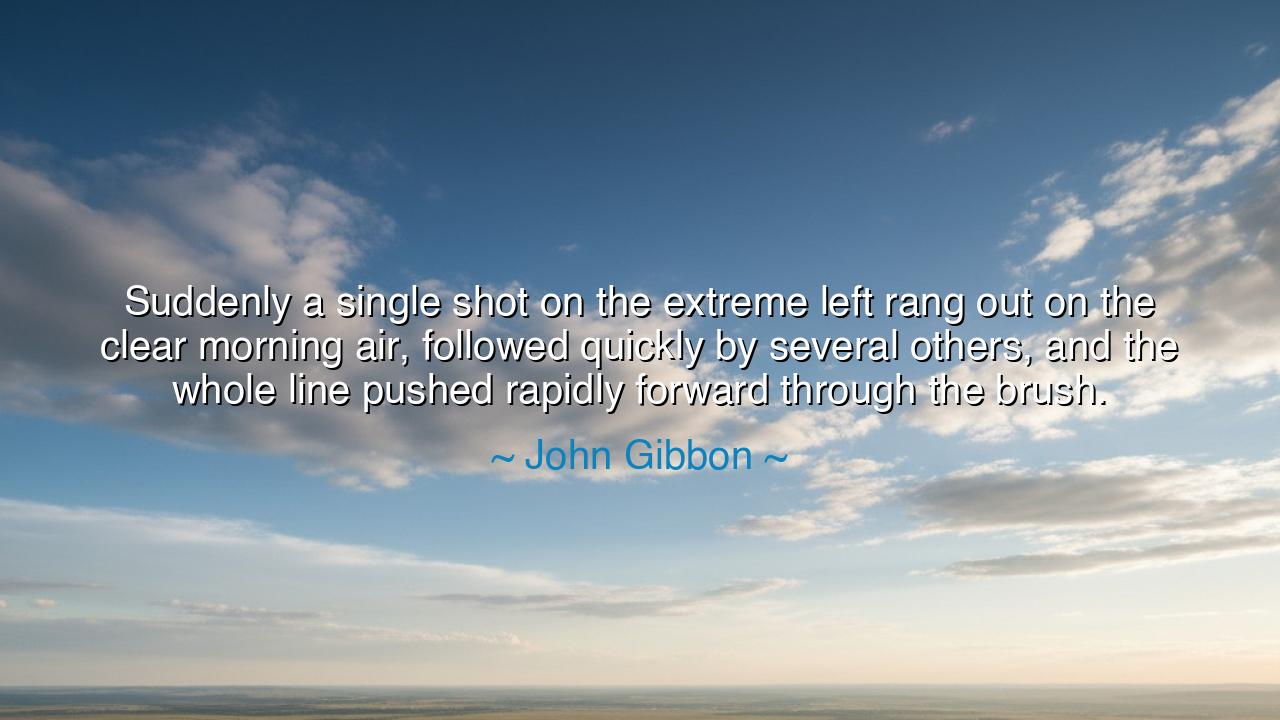
Suddenly a single shot on the extreme left rang out on the clear
Suddenly a single shot on the extreme left rang out on the clear morning air, followed quickly by several others, and the whole line pushed rapidly forward through the brush.






“Suddenly a single shot on the extreme left rang out on the clear morning air, followed quickly by several others, and the whole line pushed rapidly forward through the brush.” Thus wrote John Gibbon, a general of the American Civil War, a man who bore witness to the chaos and terror of battle. His words are not dressed in poetry, yet they pulse with the raw energy of war: the moment when silence breaks, when the stillness of morning is shattered by a single shot, and an entire line of men is set into motion. This quote is not merely a description of an event—it is the capture of a truth eternal: that great movements often begin with a small spark, that silence turns to storm in an instant, and that once begun, there is no turning back.
The origin of this saying comes from Gibbon’s memoirs and reports as a Union officer, recounting his experiences during campaigns such as Gettysburg. As a commander, he knew the weight of these moments: when the first shot rang out, there was no stopping the tide of men surging forward into fire and death. The line pressing through the brush was not just soldiers—it was the embodiment of courage and fear, discipline and chaos, all bound together in the instant when war erupts. His words preserve the breathless transition from peace to combat, from stillness to fury.
The ancients, too, spoke of such moments. Herodotus tells of the Battle of Marathon, when a single trumpet sounded and the Athenians rushed down upon the Persians. In Homer’s Iliad, a spear hurled by one warrior often shattered the calm before both armies surged together like storm-driven waves. The rhythm is the same: the quiet of morning, the sudden cry, the unstoppable advance. For all generations, men have known that history can pivot on the ringing of a single shot.
History gives us another lesson in the story of Lexington and Concord, where “the shot heard round the world” marked the beginning of the American Revolution. No grand declaration, no trumpet of ceremony—only a single musket fired on a village green. Yet from that small sound, the world was changed. Just as Gibbon described, one shot became several, and soon entire lines of men pushed forward into the unknown. So too at Gettysburg, where Gibbon himself commanded men in the Union line—silence broken, destiny forged.
From this we learn that moments of great consequence often come suddenly, without warning. The stillness of our lives may be broken in an instant, and we are thrust forward whether we will it or not. The first shot may come as crisis, as opportunity, or as the call of destiny, but when it comes, hesitation must give way to action. To shrink back is to be swept aside; to move forward is to meet the moment with courage. Gibbon’s words remind us that life itself often unfolds in this rhythm: silence, spark, and the forward surge.
Practical wisdom follows: be prepared in the quiet hours, for you do not know when the shot will ring out. The soldier drills not because he loves repetition, but because he knows the moment will come when he must rise without hesitation. So too must we train our minds and spirits: through discipline, reflection, and practice in small things, so that when the great test arrives, we too can “push forward through the brush” without fear.
Thus, remember the lesson in Gibbon’s words: a single shot can awaken a world. Do not despise the quiet, for it prepares you; do not fear the sudden spark, for it summons you. When your moment arrives—whether in struggle, in opportunity, or in the call to serve—may you be ready to rise, to move, and to press forward, as those soldiers did in the clear morning air, unflinching in the face of destiny.






AAdministratorAdministrator
Welcome, honored guests. Please leave a comment, we will respond soon